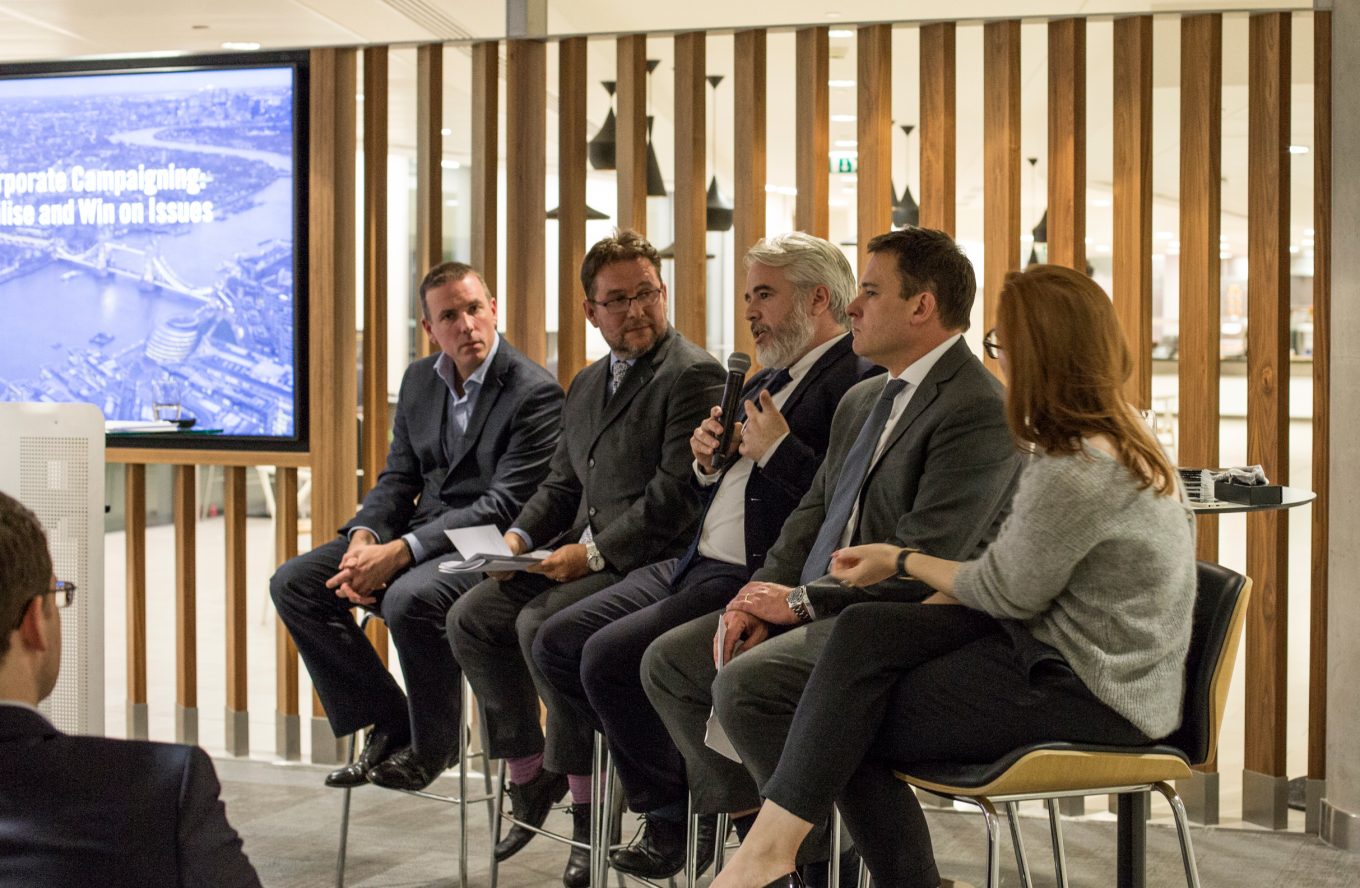Five things we learned from our event: The New Rules of Corporate Campaigning
Against a backdrop of political turmoil over the past 18 months – think Trump, Macron, Brexit – the traditional political campaigning handbook has been proverbially ripped up. We wanted to uncover what corporates must learn from the new rules of the game. In partnership with NationBuilder, FHF London hosted a panel discussion with five distinguished guests offering their expert opinions on how best to engage, mobilise and win on issues in 2017.
Joining us for a panel discussion were Dan Roberts, Brexit Policy Editor at The Guardian (and former Washington bureau chief); Toni Cowan-Brown, Vice President at NationBuilder; Stuart Hand, Director of Field Campaigns for Open Britain; Nigel Fairbrass, former Global Media Director at G4S; and FleishmanHillard’s very own Nick Andrews, EMEA Reputation Lead.

You can’t just campaign on facts, you need to tell a human story
Whilst talking about his time spent in the ‘Rust Belt’ during the U.S. presidential election, Dan Roberts spoke of meeting with a man in rural Ohio who, when questioned about his support for Donald Trump, replied with: “well, what is the worst that could happen?” Regardless of the facts – GDP growth, drop in unemployment – some people’s situation couldn’t get much worse, and therefore, to them, the facts are irrelevant. When campaigning, companies need to tell a more human story and be prepared to talk about an emotional topic that has its roots in the way people actually feel, in order to mobilise. Dan highlighted the new adverts in the UK by Jigsaw, a fashion brand, making a passionate defence of immigration by declaring that they “need beautiful minds from around the world” to succeed as an organisation. Campaigns can’t just be based solely on facts because people don’t care about facts the way they used to.
Campaigning is no longer only for the political veterans
Historically, campaigning has only been associated with the political elite – it conjures up images of door-to-door canvassing by experienced volunteers with the party rosette pinned to the lapel. But Nigel Fairbrass and Toni Cowan-Brown explained that corporates must all be in campaigning mode, all the time, too. In order to achieve their goals, corporates should put in place the processes and structures that work in an organised but flexible way to address business and political issues in a changing environment. Building a community of interested people, engaging this community effectively and then issuing a clear call to action will allow organisations to not only achieve their goals, but have people fight their corner, too.
Big numbers mean nothing if the campaign isn’t targeted
The Remain campaign during the Brexit referendum was hitting big numbers. Stuart Hand explained that a record number of 7,492 volunteers on the streets racked up an estimated 95,473 volunteer hours – much more than the Leave campaign. But the data the campaign was using wasn’t targeted enough, meaning the campaign wasn’t reaching out beyond its core vote,. This stands in stark contrast to the Conservatives 2015 General Election campaign, which centred on community campaigns that were highly targeted and data-driven. Toni Cowan-Brown echoed this, emphasising that very few companies connect data pieces in the right ways to understand their followers’ or advocates’ interests and needs so they can engage them effectively. Having large numbers of volunteers, followers or consumers doesn’t mean anything unless the data on them is used in the right way.
Measurability is critical to reputation management
Nigel Fairbrass reminded us that politicians are elected once every few years, whereas companies face an election every day. Transparency and accountability are vital to pass these daily “elections” with their reputation intact, with effective measurement of communications activities at the heart of it. Nigel had two warnings on this front. First, he felt marketing departments, with their strength in data and measurement, will come back for their lunch in this area, having ceded ground over the years to PR departments. Communications needs to be more evidence based. Second, he warned that the EU General Data Protection Regulation (GDPR) coming next May will require transparency (and create new restrictions) in many areas which the industry has taken for granted over the years.
Corporates need to start empowering more people to tell their story
Nick Andrews took us through some of the key findings of FleishmanHillard’s survey, the Authenticity Gap, defined as the gap between what people expect of an organisation and what they actually experience. The survey shows that leaders of companies come second to last as credible sources of information; a mere 11% of people think that CEOs are credible sources of information. In contrast, employees and people who work for the company rank second overall. Corporates need to start empowering trusted employees to tell their story and become advocates, because people simply believe less of the information from people in positions of leadership. While this feels like a loss of control, it actually means companies are using the people who know them best to serve as advocates.
These five lessons are just a few of the new rules of corporate campaigning. In the coming weeks, FHF London will continue to examine how companies can understand and adapt to this new landscape to their best advantage.
Ben Walters, Corporate Communications
Find Out More
-
Platinum CMS Award
March 13, 2024
-
Changing Communications Tack at Mobile World Congress
February 21, 2024


